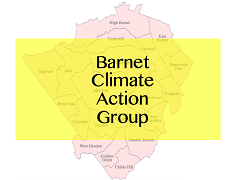12th February 2020, 6.30pm, St Mary’s Church, Hendon Lane N3 1TR
NOTES
Present: 27
Welcome By Philip Davison and reading of poem – “The meaning of existence” by Les Murray.
Syed Ahmed gave an update on Barnet Climate Action Group (BCAG)
We agreed to link ourselves to the Friends of the Earth Climate Groups which will give us access to information and resources
Charles Wicksteed had offered to build a BCAG website. This now exists in skeleton form. It can be found at barnetclimate.org.uk. Claire Martin is happy to run @barnetclimate twitter. [Update: this page used to say “Actually @B_C_A_G”, the old name, but now it is indeed @BarnetClimate (Ed)]
Syed Ahmed, Jeffrey Newman and Philip Davison met with the Barnet Director of Environment, Geoff Mee, Adam Driscoll and Robert at the council offices in Colindale. There is a desire to actively promote dialogue. The climate message needs better coordination. There is an issue of politics in this borough (!). It was acknowledged that information for businesses and residents was hard to find on the website. GM and Barnet Environment are taking these matters seriously.
Letter to Theresa Villiers – a work in progress with Green Christians Barnet.
Presentation: The Future of Transport and Energy in London, Alex Gilbert
Alex is an investor and advisor and focuses on opportunities within Clean Technology, Future Infrastructure and the Energy Transition.
Alex acts as an independent ‘Green Infrastructure’ investor and advisor, focusing on: the ‘energy transformation’; clean-tech investment; and the financing of smart, low carbon, sustainable cities.
He is currently curating, commercialising and delivering the energy projects that will assist in the transformation of TfL; London’s largest and most significant energy user.
The context – increase in powers of Local Authorities and cities with decline at national level. The direction is the rise of the city state. London has notable cohesion.
TFL – working for innovative integrated infrastructure. TFL is a transport authority but much more beside. It has power and influence to make an impact on the city greater than similar organisations in other cities eg building 10,000 homes – the most active housebuilder in London – operating 17 modes of transport. With integration it can achieve as low carbon as possible. There is need to support SMEs, local enterprises and logisitics – 500million packages come into London.
What is the future of the city? More congestion, more deliveries and returns. There is a need to join up freight fleet organisation corporate sellers, streets and modes of transport.
The way we order is important – bulk buy, local drop offs.
Target is to have 10,000 banks of lockers impacting both the environment and community.
Q – next day delivery – we are used to it but is it necessary?
Transport and energy.
Commercial development: TFL has some 6,000 acres
Waste heat capture: fuel poverty is a big issue, along with the movement to low carbon homes. Working on capturing heat from the tube both to get it out of the underground system and also use it to heat homes
Renewables wherever possible – using rooftops for solar. Feasibility of trackside solar?
Electric vehicles: charge point hubs.2040 mayor strategy is 80% journeys not by car. Demise of the car in the inner city? TFL to lead on building hubs. Infrastructure not like functional patrol stations and not piecemeal development but rather strategic placing.
Electrification is essential – buses 2030 and zero carbon rail.
Q – is proposal to increase air quality in the tube? Yes! Air quality is a big issue. Problem is cleaning stations and old trains and tunnels. We are though not in the tube for that long. Looking at sucking particulates out of the air. Ultimately new trains.
Q – local transport issue West London Orbital railway (Cricklewood to Ealing) The tracks are already there
Q – Electric Vehicle chargers in Barnet, TFL thoughts.
How do we drive down car ownership and what will replace it? TFL talks to all boroughs. There are different types of charging, slow (home), fast and rapid (50KW+). Rapid charging is closer to filling with petrol.
TFL concentrate on those who have to drive – taxis and fleets – public will be less than 1/3. Co-locate with bus hubs, elockers and ebikes. There is a danger of EV congestion as ULEZ expands. Aim is to decrease use of cars.
TFL housing developments are all car free.
Q – terrace houses parking and charging. Need to rethink future of fuel. Need to provide a service – public charging facility.. Possibility of shared taxi-type transport. With latest technology pick up on demand. Increase in charging points means increase in electricity supply – is that all renewables?. City planning – private hire taxi option with car share and ride share. In Netherlands developments have 30 flats with 4 shared cars.
Hubs with top quality facilities, possibly local solar. Offer many opportunities to charge and dynamic pricing eg solar in middle of day for free.
Pressures in grid are huge. Decarbonising electricity required – still using fossil fuels.. Essential national question – keep decarbonising the grid.
Q – e-cargo bikes: TFL has a freight strategy stepping down ultimately to cargo bikes for the last mile (the most expensive part of the system)
Q – storms and resilience plans of TFL and flood prevention. There is team focusing on climate change, adaptation & mitigation. Also house building.
Q – cool tubes? Adaption to climate change challenge also an opportunity eg waste heat.
Q – phone charging lockers at Victoria station. Revenue £100K per year yet got rid of…terror threat!
Nov 29 5.035million journeys a record.
Heat – old stock. Need for deep tube upgrade, Northern line is deepest tube in world.
Q – orbital route. Is it necessary?
Realism necessary. Possibilty of trams in outer boroughs
Local transport and get rid of short journeys across London
DLR change in communities astonishing
Opportunities new communities city energy etc
